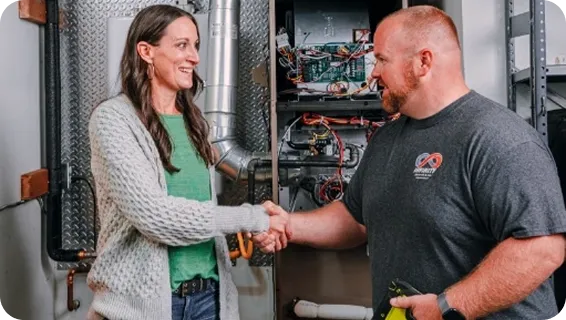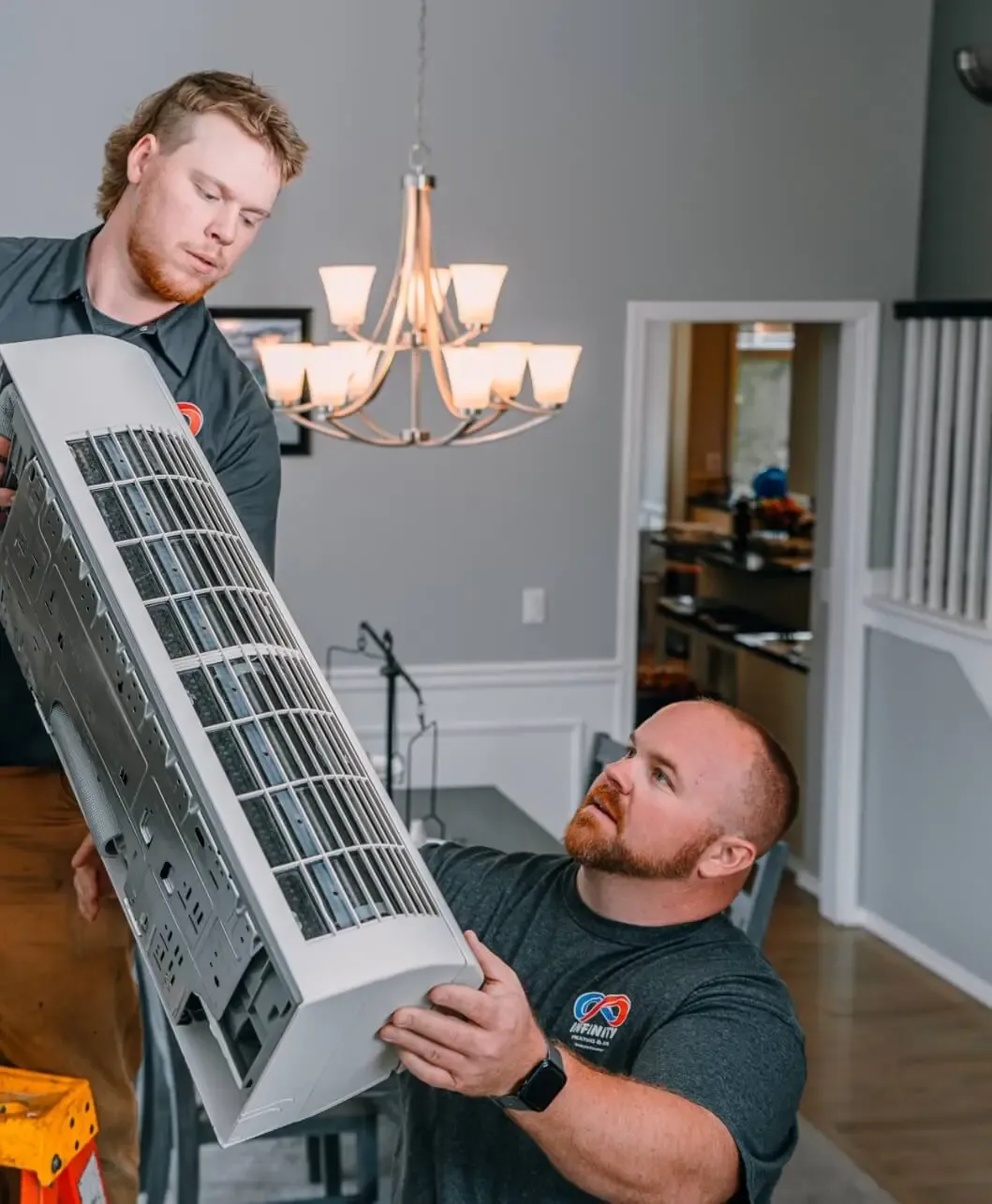
Duct Sealing Demystified: Your Guide to Energy Efficiency
air duct sealing, HVAC services, energy efficiency, indoor air quality, leaky ducts, benefits of sealing ducts, professional duct sealing, DIY duct sealing
.webp)

Why Air Duct Sealing is Critical for Northwest Washington Homes
Air duct sealing is the process of identifying and closing leaks in your home’s heating and cooling system that waste energy and compromise comfort. In houses with forced-air systems, ducts distribute conditioned air throughout your home – but when they leak, you’re literally paying to heat or cool your attic, crawlspace, and walls instead of your living space.
Quick Answer: What is Air Duct Sealing?
- Purpose: Seal holes, gaps, and disconnections in HVAC ductwork
- Methods: Mastic sealant, foil tape, or professional sealing services
- Benefits: Reduce energy waste, improve comfort, improve air quality
- Impact: Can save 20-30% on heating and cooling costs
- Timeline: DIY projects take 2-4 hours; professional sealing takes 4-8 hours
The numbers tell a sobering story. According to research, about 20 to 30 percent of the air that moves through the duct system is lost due to leaks, holes, and poorly connected ducts in a typical house. That means nearly one-third of the air you’re paying to heat or cool never reaches its intended destination.
For homeowners in Northwest Washington, where climate extremes demand reliable heating and cooling, leaky ducts create a double problem. Not only do they waste energy and drive up utility bills, but they also allow unconditioned air, moisture, and contaminants to enter your home – contributing to the dampness and poor air quality that many local homeowners struggle with.
The good news? Sealing your ducts is one of the most effective home improvements you can make. Whether you tackle accessible leaks yourself or invest in professional sealing services, you’ll see immediate improvements in comfort and long-term savings on energy bills.
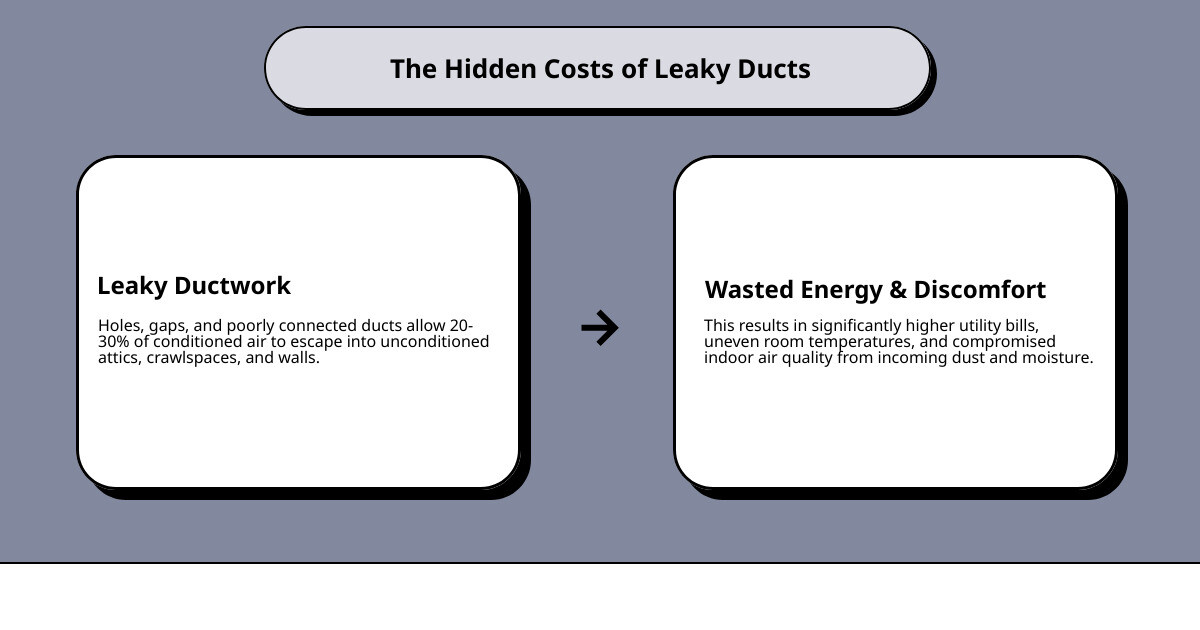
Is Your Home Losing Air? 7 Signs of Leaky Ductwork
Picture this: you’re paying to heat or cool your home, but a good chunk of that perfectly conditioned air is sneaking out through cracks and gaps before it ever reaches you. It’s like filling a bucket with holes in it – frustrating and expensive.
The reality is sobering. The Department of Energy tells us that the average home loses anywhere from 25% to 40% of its conditioned air through duct leaks. That means nearly half of what you’re paying for might be warming your attic instead of your living room.
But how can you tell if your home is playing this expensive game of hide-and-seek with your heated and cooled air? Your house actually gives you plenty of clues – you just need to know what to look for.
High utility bills are often the first red flag. If your heating and cooling costs seem higher than they should be, especially compared to your neighbors, leaky ducts might be the sneaky culprit. Your HVAC system has to work overtime to make up for all that lost air, and that extra effort shows up on your monthly bill.
Uneven room temperatures tell another part of the story. When some rooms feel like a tropical vacation while others remind you of a walk-in freezer, that’s your ductwork failing to deliver conditioned air where it’s supposed to go. This is especially noticeable in rooms that are hard to heat or cool – typically those farthest from your HVAC unit or with ducts running through unconditioned spaces.
Beyond temperature issues, you might notice stuffy or uncomfortable rooms that never seem to get fresh air circulation. Poor air duct sealing doesn’t just affect temperature – it disrupts the entire airflow pattern in your home, leaving some spaces feeling stagnant and uncomfortable.
Excessive household dust can be another telltale sign, especially when it seems like you’re dusting constantly but the dust keeps coming back. Leaky return ducts act like vacuum cleaners in reverse, pulling unfiltered air from attics, crawlspaces, and wall cavities – complete with dust, insulation fibers, and other debris that then gets distributed throughout your home.
Your nose might detect problems too. Musty odors from vents often indicate that your ductwork is drawing in air from damp or dirty areas. These smells aren’t just unpleasant – they can signal potential indoor air quality issues that affect your family’s health.
Sometimes the signs are more direct. Listen for whistling, hissing, or rattling sounds coming from your ductwork, especially near joints and connections. You might even spot visible gaps or loose connections where duct sections meet. A simple test involves holding your hand near duct joints and connections – if you feel air escaping, you’ve found a leak that needs attention.

If any of these signs sound familiar, your home could benefit significantly from improved air duct sealing. The good news? Addressing these issues can dramatically improve your comfort while reducing those monthly utility bills.
The Powerful Payoffs of Sealing Your Ducts
Think of air duct sealing as giving your home a superpower upgrade. When you stop those sneaky air leaks, you’re not just patching holes – you’re changing your entire living experience. The benefits ripple through every aspect of your home, from your monthly budget to your family’s health.
Energy savings top the list of rewards, and for good reason. When your ducts aren’t hemorrhaging conditioned air into your attic or crawlspace, your HVAC system finally gets to work smarter, not harder. Research shows that sealing ducts can slash your energy consumption by up to 30% annually. That’s like getting a month of free heating and cooling every year – who wouldn’t want that?
Those lower heating and cooling bills aren’t just a nice bonus; they’re money back in your pocket every single month. Some homeowners save hundreds of dollars each year simply by stopping air from escaping where it shouldn’t. Your furnace and air conditioner can finally take a breather instead of running overtime to compensate for lost air.
But the financial benefits are just the beginning. Improved home comfort might be even more valuable than the energy savings. Remember those rooms that always felt too hot or too cold, no matter what you did with the thermostat? Sealed ducts deliver conditioned air exactly where it’s supposed to go, creating consistent temperatures throughout your home. No more wearing sweaters in the living room while the bedroom feels like a tropical paradise.
Better indoor air quality is where duct sealing becomes a health hero. Those gaps and holes in your ductwork aren’t just letting air escape – they’re also inviting unwanted guests like dust, dirt, insulation fibers, and mold spores into your home’s air supply. When you seal these openings, you’re essentially installing an invisible shield that keeps contaminants from circulating through your living spaces.
For families dealing with reduced health issues like allergies, this improvement in air quality can be life-changing. Less dust and fewer airborne irritants mean fewer sneezing fits, clearer breathing, and more comfortable nights of sleep. It’s amazing how much better everyone feels when the air they’re breathing is actually clean.
Your HVAC system will thank you too. Extended HVAC system lifespan happens naturally when your equipment doesn’t have to work overtime. Instead of constantly struggling to maintain temperatures while losing air through leaks, your furnace and air conditioner can operate at their intended efficiency levels. This reduces wear and tear, potentially adding years to your system’s life and saving you from premature replacement costs.
Finally, there are the environmental benefits that extend far beyond your front door. When your home uses less energy, it creates a smaller carbon footprint. You’re doing your part to protect the environment while enjoying a more comfortable home – it’s the kind of win-win situation that makes everyone feel good.
The beauty of air duct sealing is that these benefits work together, creating a cascade of improvements that touch every aspect of your home life. Better comfort, cleaner air, lower bills, and a healthier planet – now that’s what we call a powerful payoff.
A Comprehensive Look at Air Duct Sealing Methods
When it comes to air duct sealing, you’re not stuck with just one approach. Think of it like fixing a leaky roof – sometimes you can patch a few shingles yourself, and other times you need the pros to tackle a complete overhaul. The key is choosing the right method based on where your leaks are hiding, how comfortable you feel with getting your hands dirty, and how thorough you want the results to be.
Here’s the reality: not all sealing materials are your friends. Some products that seem like obvious choices (we’re looking at you, gray duct tape) will actually make things worse over time. Let’s break down what works, what doesn’t, and when to call in reinforcements.
MethodEffectivenessAccessibilityBest Use CasesWhat to AvoidDIY: Mastic SealantHigh for accessible leaksRequires direct accessVisible gaps, cracks, and joints in accessible ductsStandard caulk, silicone sealants not rated for ductsDIY: UL 181-Rated Foil TapeHigh for accessible seamsRequires direct accessSeams and connections on accessible ductsRegular gray “duct tape” (it’s not for ducts!)Professional Sealing ServicesVery High (up to 99% reduction)Seals hidden, inaccessible leaksWidespread leakage, hidden ducts, maximizing efficiencyUncertified contractors, cheap, non-HVAC specific sealants
The DIY approach works beautifully when you can actually see and reach the problem areas. If your ducts run through accessible basements or crawlspaces, you can make a real difference with the right materials and a bit of patience. But when leaks are hiding behind walls or in tight spaces where you’d need to be a contortionist to reach them, that’s where professional sealing services become your best friend.
The DIY Approach to Air Duct Sealing
Rolling up your sleeves for some air duct sealing can be incredibly satisfying – there’s something rewarding about knowing you’ve personally plugged those energy-wasting leaks. Plus, if your ductwork is reasonably accessible, you can make a meaningful dent in the problem without breaking the bank.
The secret sauce here is using materials that are actually designed for the job. Your ducts deal with temperature changes, pressure fluctuations, and constant airflow – they need sealants that can handle that kind of stress for years to come.
Mastic sealant is your heavy hitter for gaps and cracks. This thick, paste-like material might look unimpressive in the bucket, but it’s engineered specifically for HVAC systems. It stays flexible as temperatures change and creates an airtight bond that lasts. You’ll apply it with a brush or putty knife, kind of like frosting a cake – except this cake helps you save money on utility bills.
UL 181-rated foil tape handles the seams and connections beautifully. Notice we said UL 181-rated – this isn’t the shiny tape you’ll find in the general hardware aisle. This stuff has been tested specifically for duct applications and won’t give up on you after a few seasons like cheaper alternatives will.
Before you dive in, turn off your HVAC system and grab a flashlight. You’re going on a leak-hunting expedition through your accessible ductwork. Look for obvious gaps where duct sections meet, places where the metal has pulled apart, or anywhere you can see light coming through. Run your hand along joints and seams – you’ll often feel air escaping before you see the problem.
Here’s your game plan: Clean the surface first – mastic and tape need a clean, dry surface to bond properly. Apply mastic generously over gaps and cracks, making sure you cover the entire problem area plus a little extra for good measure. Use foil tape on seams by pressing it down firmly and smoothing out any air bubbles. Don’t forget the spots where ducts connect to your walls, floors, or ceilings – these transitions are common trouble spots.
The most common mistake? Using regular gray “duct tape” for actual ducts. Despite its name, this tape wasn’t designed for HVAC systems and will fail relatively quickly. It’s one of those naming ironies that costs homeowners money every year.
For a comprehensive walkthrough with helpful diagrams, check out the Do-It-Yourself Guide to Seal and Insulate with ENERGY STAR. It’s packed with practical tips that can save you time and frustration.
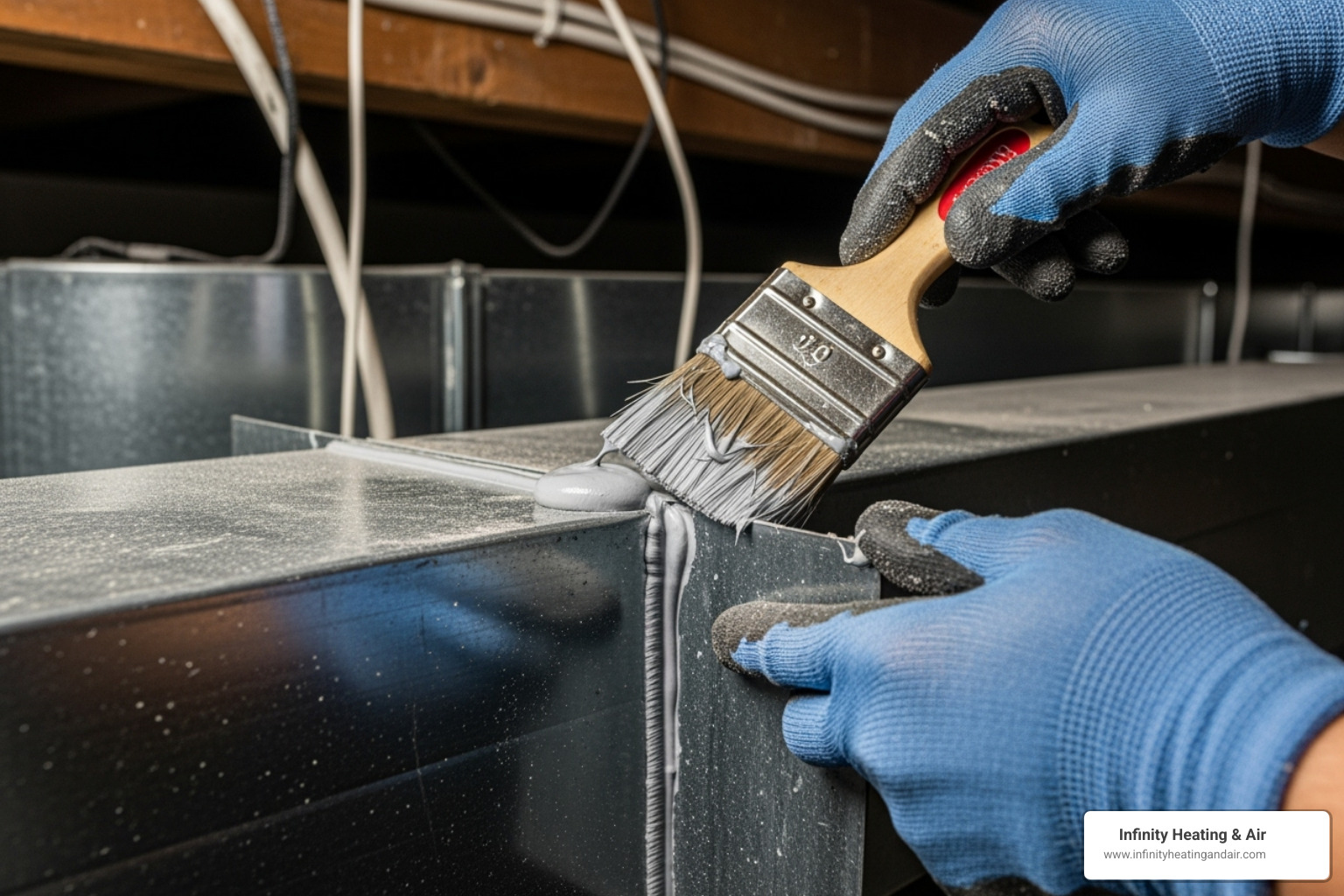
DIY sealing works great for the leaks you can see and reach. But what about all those hidden troublemakers lurking behind your walls or in impossible-to-reach spaces? That’s where professional solutions really shine.
Advanced Air Duct Sealing: Professional Solutions
Sometimes the best tool for the job is a professional who knows exactly how to use it. When your air duct sealing needs go beyond what you can tackle on a weekend afternoon – or when you want to achieve the most thorough results possible – professional services bring game-changing technology to your home.
The real magic happens with systems that can seal leaks you’ll never see or reach. Professional technicians use specialized equipment that approaches the problem from the inside of your ducts, finding and sealing leaks throughout your entire system, not just the accessible parts.
Here’s what makes professional sealing so effective: specialized equipment that can pressurize your entire duct system and identify exactly where air is escaping. Advanced sealants that are applied as aerosols, finding their way to leak sites automatically. System testing and verification that provides measurable proof of improvement – you’ll know exactly how much better your system performs after the work is done.
The process starts with a thorough diagnostic test that measures your current leakage rate. Then, professional-grade sealants are introduced into your pressurized duct system. As air tries to escape through leaks, the sealant particles are drawn to those exact spots, building up and plugging the holes from the inside. It’s like having a repair crew that can work in spaces too tight for human hands.
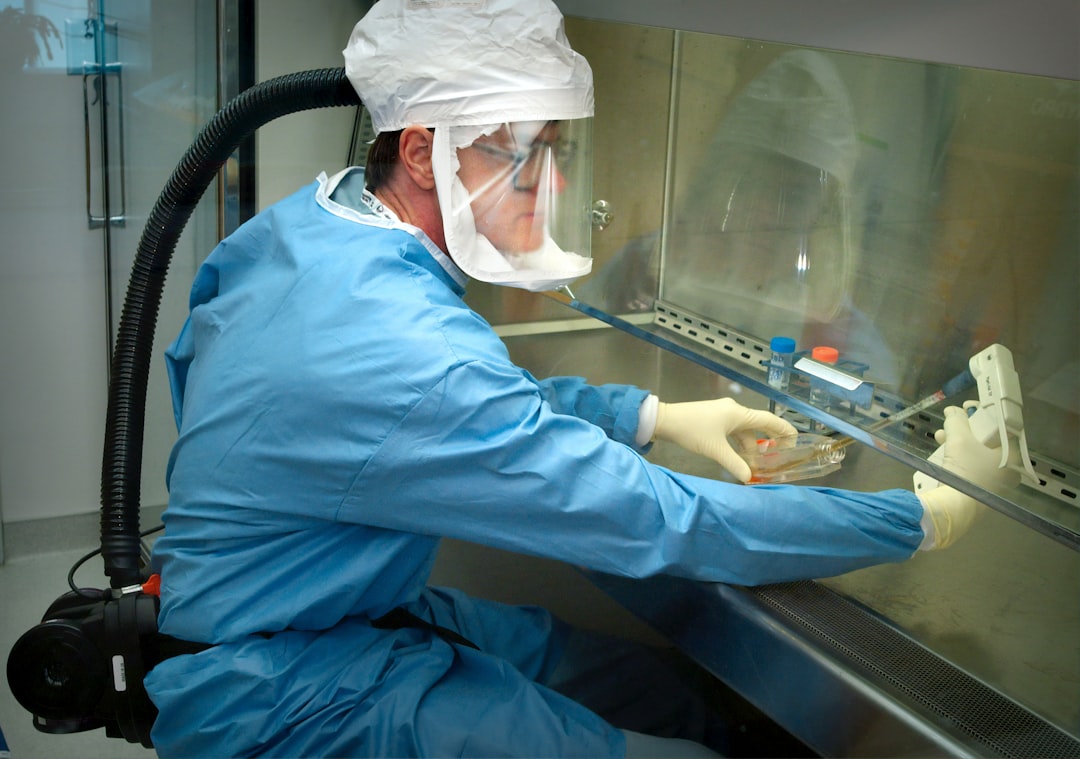
What really sets professional services apart is their ability to reach inaccessible leaks without tearing into your walls or crawling through impossible spaces. They can achieve dramatically better results – often reducing leakage by 80-90% throughout your entire system. The long-term durability is exceptional, with professional-grade sealants lasting for decades under normal conditions.
Professional sealing also delivers immediate comfort improvements. When your system stops losing conditioned air to hidden spaces, every room receives the heating or cooling it’s supposed to get. Your HVAC equipment works less hard and lasts longer, and your indoor air quality improves as the system stops pulling in dust and contaminants from unconditioned spaces.
The best part? You get measurable, verifiable results. Professional services include before-and-after testing that shows you exactly how much improvement you’ve gained. It’s not guesswork – it’s documented proof that your investment is paying off in improved efficiency and comfort.
At Infinity Heating & Air, we’re committed to helping Northwest Washington homeowners achieve the comfort and efficiency they deserve through professional air duct sealing solutions that deliver lasting results.
Frequently Asked Questions about Duct Sealing
When homeowners in Northwest Washington start considering air duct sealing, we hear the same questions again and again. It’s natural to want to understand what you’re getting into before making any home improvement decisions. Let’s tackle the most common concerns we encounter so you can move forward with confidence.
How long does professional duct sealing last?
Here’s some great news: when done right, professional air duct sealing is built to last. The longevity really comes down to the quality of materials and methods used, and that’s where advanced techniques like Aeroseal truly shine.
The durability is honestly impressive. Research labs have put the Aeroseal sealant through rigorous testing and found it can maintain its effectiveness for up to 40 years. That’s longer than most people stay in the same house! For residential applications, we back this up with a solid 10-year guarantee, giving you real peace of mind about your investment.
What makes this even better is the return on investment. Those energy savings start showing up on your very next utility bill, and the payback period typically runs just 1-4 years. After that? You’re enjoying decades of reduced energy bills, consistent comfort, and cleaner indoor air. It’s hard to find a home improvement that keeps paying you back for that long.
Can I use regular gray duct tape to seal my ducts?
Oh, this question! It’s probably the biggest myth in home maintenance, and we understand the confusion completely. Despite what the name suggests, regular gray “duct tape” is absolutely the wrong tool for the job. It’s one of those unfortunate naming mix-ups that has led countless homeowners astray.
Here’s why that familiar gray tape will let you down every time. The adhesive breaks down quickly when exposed to the temperature swings inside your ductwork – think hot air in winter, cool air in summer, and all the humidity changes in between. Within months, you’ll likely find it peeling off in sad, curled strips.
Beyond the lack of durability, regular duct tape isn’t fire-rated or smoke-rated, which creates safety concerns and typically violates building codes. You’re essentially putting a band-aid on a problem that needs surgery.
Instead, reach for UL 181-rated foil tape or mastic sealant for any DIY projects. These materials are specifically engineered for ductwork, designed to handle the pressures, temperatures, and demands of your HVAC system. They’ll actually stick around and do the job you need them to do.
When should I hire a professional instead of doing it myself?
While we admire the DIY spirit, there are definitely times when calling in the pros makes the most sense. Think of it like this: you might change your own oil, but you probably wouldn’t rebuild your engine.
Inaccessible ductwork is the biggest factor. If your ducts disappear into tight crawlspaces, cramped attics, or worse yet, inside walls and ceilings, DIY sealing hits a wall pretty quickly. Professional methods like Aeroseal can reach these hidden leaks without us having to tear apart your home.
When you’re dealing with widespread leakage throughout your entire system, a DIY approach might only catch the obvious problems. We can perform comprehensive diagnostic tests that pinpoint every leak, big and small, then apply solutions that seal your whole system properly.
Here’s something many homeowners really appreciate: performance testing and verification. When we finish a professional sealing job, you get concrete before-and-after data showing exactly how much we’ve improved your system. It’s satisfying to see those numbers prove the investment was worthwhile.
Sometimes it simply comes down to time and tools. Air duct sealing can be messy, time-consuming work, especially when you’re being thorough about it. If you’re short on either patience or the right equipment, we can get the job done efficiently while you focus on the things you’d rather be doing.
If you’ve already tried DIY sealing but you’re still battling uneven temperatures, high energy bills, or persistent dust issues, that’s a strong sign there are deeper problems that need professional attention. Sometimes those disconnected duct sections require manual repair before any sealing can even begin.
For Northwest Washington homes where comfort and efficiency really matter year-round, professional air duct sealing often delivers the comprehensive, lasting results that make the biggest difference in how your home feels and performs.
Conclusion: Reclaim Your Comfort and Efficiency

Think about it – you’ve been living with an invisible energy thief in your home, one that’s been quietly stealing your comfort and inflating your bills. But now you know better. You’ve finded the telltale signs of leaky ductwork, from those stubborn cold spots to the endless dust that seems to appear overnight. More importantly, you’ve learned that air duct sealing isn’t just about fixing a problem – it’s about changing your home into the comfortable haven it was meant to be.
The path forward is clearer now. Whether you roll up your sleeves for a DIY weekend project with mastic sealant and foil tape, or you decide to invest in professional sealing services that can reach every hidden leak, you’re making a smart move. The benefits speak for themselves: dramatically lower energy bills that put money back in your pocket, consistent temperatures that end the thermostat wars, and cleaner indoor air that helps your family breathe easier.
But here’s what really matters – this isn’t just about the immediate improvements. A properly sealed duct system is like giving your home a gift that keeps on giving. Your HVAC system will thank you by running more efficiently and lasting longer. Your family will enjoy the comfort of consistent temperatures year-round. And yes, even the environment benefits when your home uses less energy.
Air duct sealing represents one of those rare home improvements where everyone wins. It’s a cornerstone of smart home maintenance that delivers both immediate satisfaction and long-term value. For homeowners in Northwest Washington, where our climate demands reliable heating and cooling systems, addressing duct leaks is especially crucial for maintaining that perfect indoor environment.
At Infinity Heating & Air, we’ve seen how transformative proper duct sealing can be. We’re passionate about helping local homeowners achieve that “endless comfort” we all crave, and we understand the unique challenges our Pacific Northwest climate presents. Your home should be your sanctuary – a place where every room feels just right, where the air is clean and fresh, and where your energy bills don’t cause sticker shock.
Ready to stop letting your comfort and hard-earned money slip through the cracks? Your sealed, efficient duct system is just a phone call away. Contact us for professional service and let’s transform your home into the comfortable, efficient space you deserve.

Endless Comfort
Starts Here
Our expert technicians are ready to serve you and your home.


